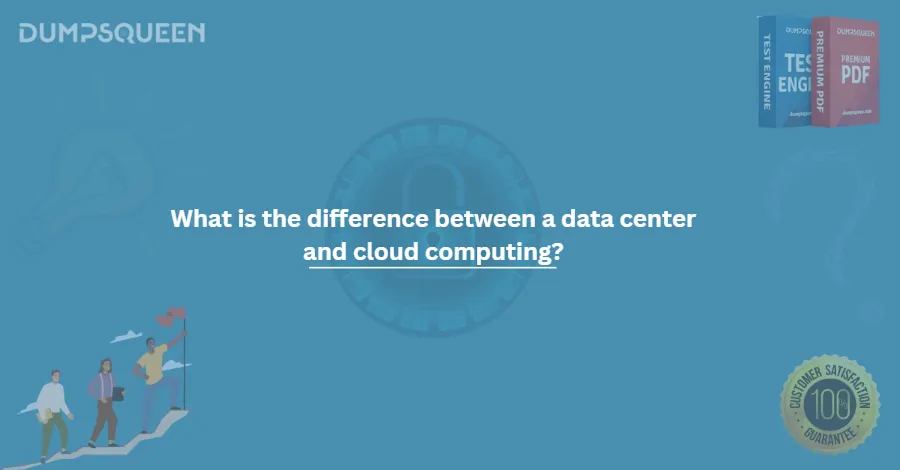Understanding Data Centers vs. Cloud Computing: A Key to Acing the CV0-003 Exam with DumpsQueen
In today’s tech-driven world, the terms "data center" and "cloud computing" are thrown around frequently, often interchangeably, by those unfamiliar with their nuances. However, for IT professionals and students preparing for certifications like the CompTIA Cloud+ (CV0-003) exam, grasping the distinction between these two concepts is not just helpful—it’s essential. Whether you’re managing physical infrastructure or leveraging scalable virtual resources, understanding these foundational elements can make or break your performance in the exam and your career. That’s where resources like DumpsQueen come in, offering clear, concise, and reliable study materials to help you master these topics and more.
In this blog, we’ll dive into what data centers and cloud computing really are, explore their key differences, weigh their pros and cons, and explain why this knowledge is critical for the CV0-003 exam. By the end, you’ll see how DumpsQueen can be your go-to companion in conquering this certification with confidence.
What is a Data Center?
A data center is the physical heart of an organization’s IT operations. Picture a large, secure facility packed with rows of servers, storage systems, networking equipment, and cooling units—all working together to process, store, and manage data. It’s a tangible, on-premises setup that companies use to house their critical applications and information.
Data centers come in various sizes, from small server rooms in an office to massive enterprise-grade facilities spanning thousands of square feet. They require significant investment in hardware, power, cooling, and maintenance to keep everything running smoothly. For example, a company might rely on its data center to host internal databases, run enterprise software, or manage customer-facing websites.
For CV0-003 candidates, understanding data centers means knowing their architecture, security protocols, and operational demands. DumpsQueen study resources break down these complexities into digestible insights, ensuring you’re ready to tackle exam questions about physical infrastructure and its management.
What is Cloud Computing?
Cloud computing, on the other hand, is a paradigm shift away from physical ownership. Instead of relying on local hardware, cloud computing delivers IT resources—think servers, storage, databases, and software—over the internet, typically on a pay-as-you-go basis. It’s like renting computing power from a provider rather than building your own data center.
Major players like Amazon Web Services (AWS), Microsoft Azure, and Google Cloud dominate this space, offering scalable, flexible solutions. With cloud computing, you can spin up virtual servers in minutes, store massive datasets, or deploy applications globally without ever touching a physical machine. It’s divided into models like Infrastructure as a Service (IaaS), Platform as a Service (PaaS), and Software as a Service (SaaS), each catering to different needs.
For the CV0-003 exam, cloud computing is a core focus. You’ll need to understand deployment models (public, private, hybrid), service models, and how virtualization powers the cloud. DumpsQueen excels here, providing practice questions and explanations that clarify these abstract concepts with real-world relevance.
Key Differences Between a Data Center and Cloud Computing
While data centers and cloud computing both support IT operations, they differ significantly in design, delivery, and management. Here’s a breakdown of the key distinctions:
- Physical vs. Virtual: A data center is a physical facility you can walk into, filled with hardware you can touch. Cloud computing is virtual, abstracting that hardware into services accessed remotely via the internet.
- Ownership and Control: With a data center, your organization owns and maintains the infrastructure, giving you full control over customization and security. Cloud computing shifts that responsibility to a third-party provider, trading some control for convenience.
- Scalability: Data centers have fixed capacity—scaling up means buying more hardware, which takes time and money. Cloud computing offers near-instant scalability; you can add resources with a few clicks and only pay for what you use.
- Cost Structure: Data centers require hefty upfront investments in equipment and ongoing costs for power, cooling, and staff. Cloud computing operates on a subscription or usage-based model, making it more cost-efficient for dynamic workloads.
- Accessibility: Data centers are typically on-site or at a specific location, limiting remote access unless configured otherwise. Cloud services are accessible from anywhere with an internet connection, enhancing flexibility.
For CV0-003 aspirants, these differences aren’t just trivia—they’re testable concepts. DumpsQueen expertly curated materials highlight these distinctions with examples and scenarios, helping you internalize them for the exam.
Pros and Cons of Data Centers
1) Pros:
Control and Customization: Owning a data center lets you tailor hardware and software to your exact needs, ideal for organizations with unique requirements.
Security: With everything on-site, you can implement stringent physical and digital security measures, reducing reliance on external providers.
Performance: Local hardware can offer lower latency for critical applications compared to remote cloud servers.
2) Cons:
High Costs: The initial investment and ongoing maintenance (power, cooling, upgrades) can strain budgets, especially for smaller businesses.
Limited Scalability: Expanding capacity is slow and expensive, making it hard to adapt to sudden demand spikes.
Maintenance Burden: Managing a data center requires skilled staff and constant upkeep, diverting resources from other priorities.
DumpsQueen study guides emphasize these trade-offs, equipping you with the knowledge to evaluate data center scenarios on the CV0-003 exam.
Pros and Cons of Cloud Computing
1) Pros:
Flexibility and Scalability: Need more power? Scale up instantly. Done with a project? Scale down and save costs. The cloud adapts to your needs effortlessly.
Cost Efficiency: No upfront hardware purchases—just pay for what you use. This makes it accessible for startups and enterprises alike.
Global Reach: Deploy applications worldwide with minimal effort, thanks to the provider’s distributed infrastructure.
2) Cons:
Dependency: Relying on a third-party provider means you’re at their mercy for uptime, security, and compliance.
Ongoing Costs: While cheaper upfront, long-term usage can add up, especially for heavy workloads.
Security Risks: Storing data off-site introduces concerns about breaches or provider vulnerabilities, despite robust safeguards.
Cloud computing is a CV0-003 cornerstone, and DumpsQueen resources shine here, offering detailed breakdowns and practice questions to master these pros and cons.
How This Applies to the CV0-003 Exam
The CompTIA Cloud+ (CV0-003) exam tests your ability to design, deploy, and manage cloud-based solutions while understanding traditional infrastructure like data centers. It’s a vendor-neutral certification, meaning you won’t focus on one provider (like AWS or Azure) but rather on universal cloud and IT principles. Here’s why the data center vs. cloud computing debate matters:
- Deployment Decisions: The exam may ask you to recommend a data center or cloud solution based on a scenario—say, a company needing high security (data center) vs. one needing rapid scalability (cloud). DumpsQueen scenario-based questions prepare you for these judgment calls.
- Architecture Knowledge: You’ll need to know how data centers support private clouds or how virtualization bridges the two. DumpsQueen simplifies these technicalities with clear explanations.
- Cost and Performance Analysis: Expect questions comparing operational costs or latency between the two setups. DumpsQueen practice tests drill these concepts home.
- Security and Compliance: Both environments have unique security challenges, and the exam tests your ability to address them. DumpsQueen covers these topics comprehensively.
With DumpsQueen, you’re not just memorizing facts—you’re learning to think like a Cloud+ professional. Their materials align perfectly with the CV0-003 objectives, ensuring you’re ready for questions about infrastructure, virtualization, and resource management.
Conclusion
In the battle of data centers vs. cloud computing, there’s no one-size-fits-all winner—it depends on the use case. Data centers offer control and security at the cost of flexibility, while cloud computing delivers scalability and convenience with some trade-offs in autonomy. For CV0-003 candidates, understanding these differences isn’t optional; it’s a ticket to passing the exam and thriving in the IT world.
That’s where DumpsQueen stands out. With its expertly designed study aids—think detailed notes, realistic practice exams, and focused explanations—it transforms complex topics into manageable lessons. Whether you’re dissecting data center architecture or mastering cloud deployment models, DumpsQueen ensures you’re equipped to succeed. As you prepare for the CV0-003 exam, let DumpsQueen be your guide to not just passing, but excelling, in your certification journey.
Free Sample Questions
What is the primary difference between a data center and cloud computing?
a) A data center is a physical infrastructure, while cloud computing relies on virtualized resources.
b) A data center is a software solution, while cloud computing is hardware-based.
c) A data center requires no maintenance, while cloud computing needs regular updates.
d) A data center is accessed remotely, while cloud computing is local.
Answer: a) A data center is a physical infrastructure, while cloud computing relies on virtualized resources.
Which of the following is an advantage of cloud computing over traditional data centers?
a) Higher physical security
b) Greater control over hardware
c) Scalability and on-demand resources
d) Limited internet access
Answer: c) Scalability and on-demand resources
What does a data center typically involve that cloud computing does not?
a) Virtualization of resources
b) A central physical location with hardware
c) Remote accessibility
d) Shared infrastructure
Answer: b) A central physical location with hardware
How does cloud computing differ in terms of infrastructure management compared to a data center?
a) Cloud computing allows for in-house infrastructure management.
b) Cloud computing does not require any network management.
c) Cloud computing is managed by third-party providers.
d) Data centers do not require any management.
Answer: c) Cloud computing is managed by third-party providers.
Which of the following is a key characteristic of cloud computing that differentiates it from a data center?
a) Requires physical storage only
b) Limited to one geographical location
c) Flexible resource scaling based on demand
d) Managed entirely by the business owner
Answer: c) Flexible resource scaling based on demand




